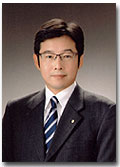The CEO message
 The CEO message>December 5, 2011
The CEO message>December 5, 2011
The CEO TOSHIHIRO HARADA
Greeting
First of all, I send our deepest condolences to the people who died in the great earthquake that occurred on March 2011 in East Japan, and our sympathies to the families of the victims.
The environment that surrounds the Japanese economy is in a crucial phase because of the earthquake, the radiation leak accident that occurred in the nuclear plant in Fukushima, the yen's sharp rise against the dollar, and a decrease in the structural working-age population. These negative factors are noticeable in the konjac root manufacturing industry where our company operates. We are voicing our concerns about the radiation poisoning of major production areas in Gunma, the bad harvest and high price of raw materials due to the weather, and the decrease in home consumption.
・・・・[continue to read]
However, the situation does not alter even if we pay attention to such negative aspects. As our company is in a period of stagnation, it has promoted internationalization and reinforced its strategy to challenge new fields within China through to Myanmar since 2004. This approach was thankfully effective as we created connections with new customers, and we were able to take advantage of the opportunity to advance into a new commodity field.
The history of konjac informs us that the origin of this root potato is from the Indo-China peninsula and from there it extended to China. According to prevailing opinion, it spread to Japan with Buddhism. Interestingly, the culture where konjac originated has not seen the same level of popularity with eating konjac as is evident in Japan. Why?
This is because the Japanese invented the technology that dries the root potato and makes it into a powder. This meant that the technical improvement enabled konjac to be preserved all year round and to be circulated widely. Around 1776, a farmer named Nakashima Fujiemon of the Mito clan (Ibaraki Prefecture today) thought of the idea to make the potato into round slices, dry it in the sun, and to make it into a powder with a mortar and pestle. Thus, arum root powder was widely sold to the whole country as a speciality. Nakajiima Touemon was permitted Myojitaito (the right to bear a surname and to wear a sword) as enriching the finance of Mito. In the later part of Edo period around 1846, the book "A Hundred Delicacies of Konjac" was published where 77 kinds of konjac dishes were introduced. As a result, knowledge of konjac spread widely among ordinary people.
Our company works on the deeper pursuit of the Japanese konjac food culture and has developed a new commodity with new usages and more functionality as a dietary fiber. We keep on sending our message out to the world. Our corporate principles offer a powerful theme of "We contribute to our society and to the human race so that it will have healthy and rich eating habits."
We thank you very much for your patronage, your support, and cooperation. We wish you all the best in your future.
My best regards.
December 5, 2011
Harada foods Co., Ltd.
The President and Representative Director Toshihiro Harada

